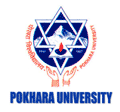
Master Of Health Informatics (MHI)
Affiliated to: Pokhara UniversityAbout Course
- Course Title : Master Of Health Informatics (MHI)
- Category/Level : Masters
- Course Duration (months) : 48 months
- Cost Range (NPR) :
- Affiliated to : Pokhara University
Course Description:
Health informatics is a multidisciplinary field that involves acquisition, management, and use of health-related information and data to improve healthcare delivery, patient outcomes, and overall healthcare system efficiency. It combines elements of healthcare, information technology, data science, and management to address the complex challenges within the healthcare industry.
A Master of Health Informatics (MHI) is a postgraduate degree that prepares students for careers in the field of health informatics. Health informatics is the study of how information and information technology can be used to improve the delivery of healthcare. It helps to develop and maintain health information systems. Health informatics professionals focus on collecting, storing, and managing public health and healthcare data. This includes health information system, digital health, patient demographics, and clinical information. Furthermore, Data Analysis, Interoperability, Telemedicine and Remote Monitoring, Health Policy and Regulation, Quality Improvement, Patient Engagement, Research and EvidenceBased Practice and Education and Training.
Career Opportunities
Career opportunities for Master of Health Informatics graduates are growing as healthcare systems increasingly adopt digital solutions and data-driven approaches. A Master of Health Informatics (MHI) opens diverse career opportunities in healthcare and technology.
Graduates can work as Health Informatics Specialists, managing health information systems; Data Analysts, analyzing healthcare data to improve decision-making; or Health IT Project Managers, leading system implementations. Other roles include Public Health Informatics Officers, supporting disease tracking and public health initiatives; Telehealth Coordinators, managing virtual healthcare platforms; and Clinical Informatics Consultants, optimizing workflow with Electronic Health Records (EHRs). Opportunities also exist as Healthcare Consultants, advising on technology integration, or as researchers, trainers, and health information managers. Potential employers include hospitals, NGOs, telehealth/mHealth providers, software companies, and international organizations like WHO and UNICEF. Key sectors include EHR implementation, digital health startups, telemedicine, and health data policy development.
In general, a Master of Health Informatics graduate can choose the following areas to build their career:
- Health Organizations (Public/NGO/Private)
- Bilateral & Multilateral Organization (WHO, UNICEF etc.)
- Health related Consultancy Agencies,
- Hospital and Health Care Organizations
- Telehealth/mHealth Sector
- Self-entrepreneurship etc.
Admission info
Eligibility
To be eligible to apply for admission to the Master of Health Informatics program, an applicant must have:
I. Bachelors in Health and Medical Sciences/Bachelor in Sciences/Engineering (Computer/Software/Information Technology/Electronics/Communication)/Mathematics/Statistics/Environmental Sciences/Computer Applications
OR
II. Bachelor's degree in any discipline and at least one year working experience in health related Government Organizations, research organizations, and NGOs/INGOs
III. Scoring of minimum CGPA 2.0 out of 4.0 (grading system) or 50% (Percentage system) from schools/colleges of Pokhara University or recognized by Pokhara University
The final admission decision is taken based on an entrance examination conducted by the Faculty of Health Sciences, Pokhara University.
Syllabus
Curricular Structure
This coursework gives students a broad and holistic view of the complexity of issues in today’s public health service environment. It includes the following three distinct components:
1. Core Courses: The core courses provide students with advanced analytical concepts and skills in core areas of health informatics, public health field, necessary for making program decisions in planning, implementing and evaluating health information. And related areas.
2. Project: Each student is required to develop a project in health informatics based on the local context of health informatics in Nepal.
3. Internship: An internship or practicum in a health institution or HMIS section, health IT department, or health system may be a requirement part of the program, providing students with practical experience.
4. Thesis: Students are required to submit a thesis in their specialization area that involves fieldwork for primary data. Students are required to prepare a thesis in a prescribed format. This course covers 12 credit hours.
INQUIRY / APPLY COURSE
Offered by
Colleges offering Master of Health Informatics (MHI) (Pokhara University) are as follows:



















